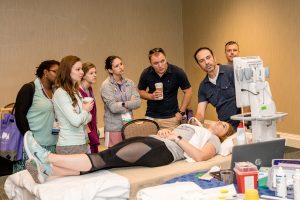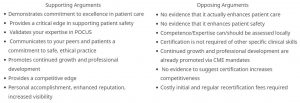Point-of-Care Ultrasound Certification – A personal or professional choice?
Training Opportunities Facilitate Expansion of POCUS
November 15, 2018
By Jonathan D. Monti, DSc, PA-C, RDMS

The emergence and adoption of point-of-care ultrasound (POCUS) in PA clinical practice is changing how PAs practice medicine. As an increased number of training opportunities facilitate the expansion of POCUS across a myriad of clinical practice settings, more and more clinicians are asking how they can demonstrate or validate their POCUS competence.
The Alliance of Physician Certification and Advancement (APCA™), a subsidiary of Inteleos, which also oversees the American Registry for Diagnostic Medical Sonography, recently launched the Point-of-Care Ultrasound Certification Academy. Initially designed for physicians, the POCUS Certification Academy now offers PAs and APRNs the opportunity to achieve POCUS certification. The fee-based certification is a two-step process, first requiring candidates to complete eight online learning modules and take an online exam on POCUS Fundamentals. Candidates can then pursue individual clinical certificates or specialty certificates, each with additional testing and cost, and each requires local attestation of candidates’ POCUS skills.
While this new opportunity for PAs to become certified in POCUS may seem positive, it is imperative that PAs considering such a program weigh its purported value and disadvantages. Commonly employed arguments for and against the value of external POCUS certification include:
Pros and cons of certification

Local verification of skills

The intent of any certification should be the validation of requisite skills in performing a task. Successful POCUS employment requires the user to be skilled in four core areas. These areas include: 1) an understanding of the indications for the exam, 2) image acquisition, 3) image interpretation, and 4) medical decision-making. Image acquisition in particular is not assessed directly by the POCUS Certification Academy. It is a skill that is arguably best assessed locally which is why the POCUS Certification Academy relies upon local peer attestation of candidates’ POCUS skills.
The next question one might ask is, “If I have a local POCUS expert who can attest to my POCUS skills, why would I pay some external agency money to do the same thing?” Local skill validation eliminates the financial burden that external certification creates, while providing the primary stakeholders (physician, facility, credentialing board) the best assurance that clinical quality assurance standards for credentialing have been met and can be continuously monitored. PAs must also consider the distinct difference between the terms “certification” and “credentialing.” Certification from an external organization by no means guarantees local credentialing to perform a particular clinical skill. While this certification may offer the portability of skill validation between jobs, a simple log or repository of individual scans could achieve the same portability, and could be accomplished at little-to-no cost.
Third party certification – a barrier?
History has demonstrated that the influence of third-party certification organizations on employers and credentialing boards can lead to additional barriers to clinical practice. This influence has led the Society of Emergency Medicine PAs and the American College of Emergency Physicians to publish statements opposing POCUS certification by external bodies. Additional commentary on this controversial topic can be found here, and AAPA’s recently completed RAND study also well-demonstrates the controversy surrounding the topic of maintenance of certification, and the limited evidence that supports it. A recent survey of the members of the Society of Point-of-Care Ultrasound, an AAPA constituent organization, found that 73 percent of respondents oppose external certification as unnecessary, costly, and time-consuming. Those that supported it most commonly cited 1) increased patient safety and 2) demonstration of personal commitment to excellence for their reasons for supporting.
On the surface it may seem advantageous to pursue these certifications; however, as momentum grows, the risk becomes the creation of yet another recurring, burdensome fee-based certification that employers and credentialing bodies increasingly demand of their clinicians, without substantiating evidence that it improves patient care. Although POCUS is widely considered to be an “operator-dependent” skill, what clinical skill isn’t operator-dependent? Should all clinical skills require similar certification? Ultimately, this could lead to another externally-imposed hurdle for our PA colleagues to overcome in providing optimal care to the patients we serve.
Innovative PA educators are rapidly incorporating POCUS training into PA educational curriculum. Institutional POCUS training programs are also growing in prevalence, thereby creating the infrastructure that increasingly allows for POCUS skill validation to be performed at the local level. Ultimately, pursuit of this certification is a personal choice, but it is naïve to think that our individual choices can’t collectively influence the trajectory of our profession. Whichever path you choose, please let your choice be a well-educated one, considerate of not only your personal goals, but the potential impact on your peers and those PAs that may follow in your footsteps, the benefits of widespread POCUS employment and the long-term impact on the PA profession.
More Resources
AAPA2019 Yes, I Scan Workshop for Students
Point-of-Care Ultrasound Diagnostic Tool on the Rise
Jonathan D. Monti, DSc, PA-C, RDMS, is medical researcher and POCUS educator, Henry M. Jackson Foundation for the Advancement of Military Medicine, Madigan Army Medical Center. Contact him at [email protected].
Thank you for reading AAPA’s News Central
You have 2 articles left this month. Create a free account to read more stories, or become a member for more access to exclusive benefits! Already have an account? Log in.



